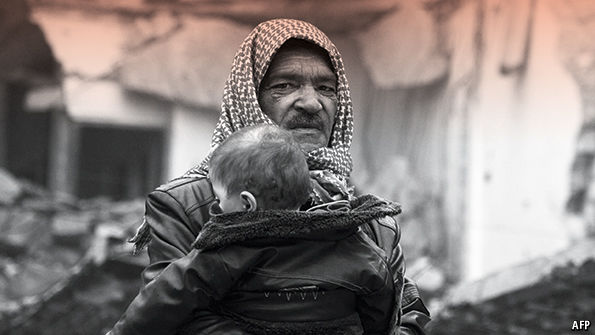
Link
To gauge the depth of Aleppo’s tragedy, remember that the first protests against Syria’s president, Bashar al-Assad, in 2011 saw Sunnis marching cheerfully alongside Shias, Christians and Kurds. From the start, with extensive help from Iran, Mr Assad set out to destroy the scope for peaceful resistance by using violence to radicalise his people. Early on, his claim that all rebels were “terrorists” was outrageous. Today some are. There were turning-points when the West might have stepped in—by establishing a no-fly zone, say; or a haven where civilians could shelter; or even a full-scale programme of arming the rebels. But, paralysed by the legacy of Iraq and Afghanistan, the West held back. As the fighting became entrenched, the need to intervene grew, month by bloody month. But the risk and complexity of intervening grew faster. As Mr Assad was about to topple, Russia joined the fray, acting without conscience and to devastating effect. Aleppo’s fall is proof that Mr Assad has prevailed and of Iran’s influence. But the real victory belongs to Russia, which once again counts in the Middle East.
Likewise, the defeat is not just a blow to Mr Assad’s opponents, but also to the Western conviction that, in foreign policy, values matter as well as interests. After the genocide in Rwanda in 1994, when Tutsis were slaughtered as the world turned its back, countries recognised that they have a duty to constrain brute force. When members of the UN accepted responsibility to protect the victims of war crimes, wherever they are, conventions against the use of chemical weapons and the reckless killing of civilians took on a new relevance. The desire to promote freedom and democracy was not far behind.
Dust and ashes
This ideal of liberal intervention has suffered grievously. The American-led campaigns in Afghanistan and Iraq demonstrated that even the most powerful country in history cannot impose democracy by force alone. The tragedy of Aleppo is less conspicuous, but just as significant. Confronted by Mr Assad’s atrocities, the West has done no more than rehearse diplomatic phrases. By failing to stand up for what it is supposed to believe in, it has shown that its values are just words—and that they can be ignored with impunity.
Plenty of people share the blame. After Mr Assad drenched his people in nerve gas, crossing an American red line, Britain’s parliament voted against taking even limited military action. As millions of people fled to Syria’s neighbours, including Lebanon and Jordan, most European countries looked the other way—or put up barriers to keep refugees out.
Particular blame falls on Barack Obama. America’s president has treated Syria as a trap to be avoided. His smug prediction that Russia would be bogged down in a “quagmire” there has proved a historic misjudgment. Throughout his presidency, Mr Obama has sought to move the world from a system where America often acted alone to defend its values, with a few countries like Britain riding shotgun, to one where the job of protecting international norms fell to all countries—because everyone benefited from the rules. Aleppo is a measure of how that policy has failed. As America has stepped back, the vacuum has been filled not by responsible countries that support the status quo, but by the likes of Russia and Iran which see the promotion of Western values as an insidious plot to bring about regime change in Moscow and Tehran.
Welcome to the bazaar
In theory, the next American president could seek to reverse this. However, Donald Trump embodies the idea that liberal intervention is for suckers. The nomination of his new secretary of state, Rex Tillerson, the boss of ExxonMobil (see article), only reinforces his campaign message: as president, Mr Trump wants to notch up deals, not to shore up values.
Striking deals is an essential part of diplomacy—especially with adversaries like Russia and Iran and competitors like China. But a foreign policy that lurches from deal to deal without a strategy or being anchored in values poses grave risks. One is that allies become bargaining chips. Mr Trump has already dangled his support for democratic Taiwan, which China claims as a renegade province, as something to be traded in exchange for help cutting America’s trade deficit with China (see article). A grand bargain that Mr Tillerson brokers with his friends in Russia and which, for instance, pulls American troops back from NATO’s front-line states in exchange for concerted diplomatic action against Iran or China would leave the Baltic states exposed to Russian aggression. An unparalleled network of alliances is America’s great strength (see article). Mr Trump must care for his allies, not trade them away.
An order based on deals also risks being unpredictable and unstable. If Mr Trump fails to strike his bargain with Russia, the two countries could rapidly fall out—and never would Mr Obama’s cool head be more missed. When might is right, small countries are locked out or forced to accept poor terms while the great powers strut their stuff. Without a framework to bind them in, deals require frequent renegotiation, with uncertain outcomes. Complex, transborder problems such as climate change are even harder to solve.
The world has seen what happens when values cannot hold back the chaos and anarchy of geopolitics. In tragic, abandoned Aleppo the fighting has been merciless. The people who have suffered most are the poor and the innocent.

No comments:
Post a Comment